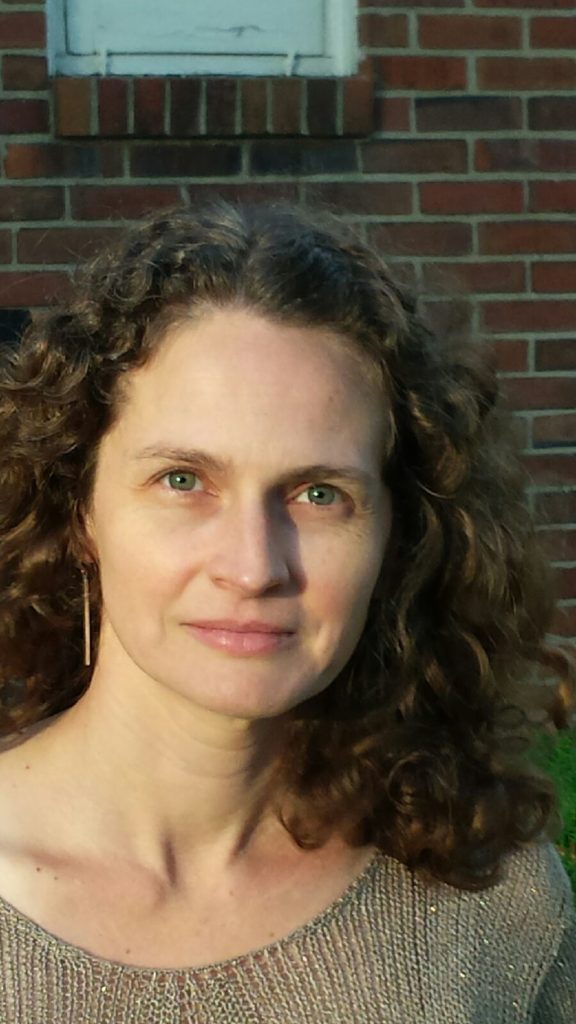Poem of the Week | March 26, 2018

Jessica Cuello: “Laundromat with Single Mother”
Jessica Cuello is the author of Pricking (Tiger Bark Press, 2016), Hunt (The Word Works, 2017), and several chapbooks. She has been awarded The 2017 CNY Book Award (for Pricking), The 2016 Washington Prize (for Hunt), The New Letters Poetry Prize, a Saltonstall Fellowship, and The Decker Award from Hollins University for outstanding teaching. Her newest poems can be found in Passages North, Crab Orchard Review, Foundry, The American Poetry Journal, and Red Paint Hill.
Laundromat with Single Mother
We put our dirty clothes in trash bags
and took a cab to the laundromat
where I gave her the cold shoulder.
The windows were floor-to-ceiling glass.
We took a cab to the laundromat
where outsiders could see my cold mother
through the floor-to-ceiling glass
getting us clean and see
how we got mothered.
Twice she birthed herself
in us. She got us clean,
a young mother who folded each piece
of cloth. Twice she gave birth.
Her clothes and ours touched her hands.
She folded each piece. I buried my face
in the warm clothes
that touched her hands.
I was the youngest child.
I buried my face in the clothes,
I was critic and girl,
the youngest child.
She stacked the piles in trash bags,
ordered her critic and girl
to keep an eye out for the cab.
She carried out the trash bags
when it was time to go
and we watched for the cab.
I was a silent, cold shoulder.
The cab honked at us to hurry
and she grabbed my
cold shoulder in silence
like it was her own limb.
Author’s Note:
When we were little, our mother didn’t have a car and we had to take a cab to the laundromat. I remain fascinated with laundromats and I stare inside them if I pass one. They often have large glass windows, which strikes me as strange since washing laundry is an intimate act. Part of the poem speaks to the idea of being publically watched, in particular mothers—especially single mothers—who are watched for the ways they do things wrong. The poor, too, have to do much of their private activity in the public eye and they are constantly scrutinized for their choices. Both the mother and daughter internalize and enact a criticism of each other while they are on display in the laundromat. Motherhood partly annihilates the self—and daughters are often in training for this invisibility and annihilation. The poem is not solely bleak, however, as it is also about the primal pleasures of washing a child’s clothes—akin to a child’s feeding. I am deeply satisfied when I fold the small, clean clothes of my children.
SEE THE ISSUE
SUGGESTED CONTENT

Poem of the Week
Apr 15 2024
“Love Poem for Lois” by Regan Green
“Love Poem for Lois” by Regan Green is our Poem of the Week. Regan Green grew up in Columbia, Tennessee, and now lives in Baltimore. She is a junior lecturer… read more

Poem of the Week
Apr 08 2024
“Gray” by Melissa Ginsburg
“Gray” by Melissa Ginsburg is our Poem of the Week. Melissa Ginsburg is the author of the poetry collections Doll Apollo (winner of the Mississippi Institute of Arts and Letters… read more

Poem of the Week
Apr 01 2024
“Pharmacy Museum Tour Guide, New Orleans” by Andy Young
“Pharmacy Museum Tour Guide, New Orleans” by Andy Young is our Poem of the Week. Andy Young’s second full-length collection, Museum of the Soon to Depart, is forthcoming from Carnegie… read more

